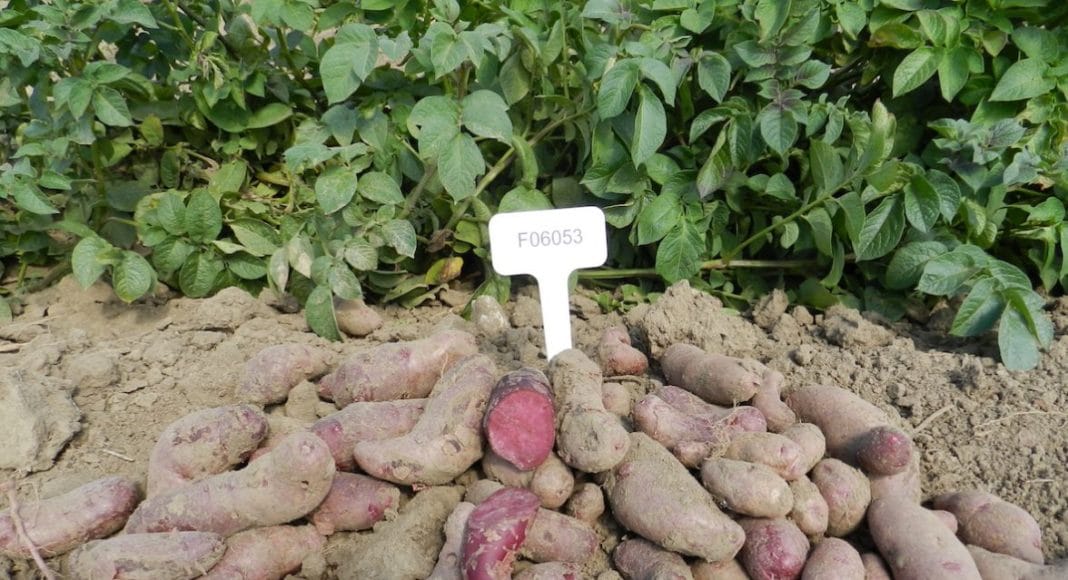[deck]Growing and selling specialty potatoes may offer opportunities to share information about health benefits.[/deck]
Although potato growers, large grocery chains and potato processors continue to meet the consumer’s insatiable appetite for fries and chips, the consumption value of all potato varieties is being lost in the bin. When the potato was given a bad reputation in the high protein diet craze, consumers began to move to other starches.
Recently, the industry has attempted to prompt a new conversation about the nutritional value of the humble spud. Now, findings in a University of Guelph (U of G) project that looked at online sources for information on potatoes determined that specialty varieties may be the way to re-introduce potatoes to the plate.
As part of the research, U of G student Leah Witteveen conducted a survey that showed while specialty potatoes are seen as an important part of the market, they are being left out of the overall marketplace. Indeed, purple, banana and other specialty varieties have become the realm of farmers markets and farm gate sales. Interestingly enough, Witteveen’s research showed consumers are keen to learn more about these varieties and to try them. As well, most of the farms selling to consumers do not have websites and those that did offered very little education on potatoes.
“The Internet is underutilized by farmers who want to market specialty potatoes,” says Dr. Andreas Boecker, associate professor at the U of G and Witteveen’s supervisor. “First you need a good marketing plan. This can be done for very little cost with the Internet, and offers a chance to learn what customers like and get ideas from new customers. Only one of the farms we surveyed has a strong business approach to direct marketing.”
For most large producers with contracts with processors, planting a few acres of specialty potatoes is a large undertaking. However, it could open up the conversation on the nutritional value and the wide variety of potatoes. The research showed there is very little information available to consumers on the Internet about specialty varieties. Even common table varieties get short shrift with only a handful of producer organizations offering information.
“Specialty potatoes may always be a small part of the overall business,” Boecker continues. “But we have seen in other industries where standardization has occurred that space is created for smaller organizations to produce something that the first group doesn’t provide.” He explains that specialty potatoes sold at the farm gate or in farmer’s markets creates an opening for producers to talk about the nutritional qualities of all potatoes, not just the specialty varieties.
Boecker says the research did not determine why the interest in speciality potato varieties is growing. He suggests it could be for many reasons, from taste to colour to shape that causes consumers to want them on their plates. It could also be the impression that specialty potatoes require less preparation as cooks might believe they don’t need to be peeled because they are small, which reduces the preparation time.
“Farmers selling at markets appeal to the local food movement and they offer a perception of freshness,” Boecker adds. “Consumers get to know the producers and it gives them the feeling they have control over what they buy.”
Larger producers could use the research as an opportunity to start a conversation with large grocery chains to learn more about what consumers want and if providing specialty varieties would be a good option. Already smaller, often independent, grocery stores attempt to source specialty potatoes or uncommon varieties in order to differentiate themselves from their bigger competitors. Perhaps talking to the smaller stores is also an opportunity to keep the nutrition conversation going.
“The industry can help provide knowledge on the healthy benefits of potatoes,” Boecker suggests. “Consumers tend to be inconsistent in their approach to getting information. Therefore, it would help if the potato industry reached out to consumers because we know that more than 70 per cent of consumers are open to learning more.”
In the project, the potato marketing boards seemed to be the most visible source for potato information from nutrition to storage to cooking. While most of the survey focused on the Ontario potato industry, some information was found outside the province.
Potatoes should remain a part of a healthy diet, Boecker says. In order to ensure this remains the case, and given the results of the research into how consumers in Ontario try to source specialty varieties, he suggests growers need to make a greater effort to use the Internet as a tool for marketing and information. Those growers offering potatoes for sale at the gate or at markets need to be well versed on the varieties and the nutritional qualities of potatoes. In addition, talking to grocery stores large and small will give growers an insight into consumer trends.
Specialty potatoes may truly be a niche market, but based on the University of Guelph research, there could be ways to introduce consumers to the overall value of potatoes. Since it seems consumers are trying to use the Internet to research these varieties, using them to initiate a larger conversation about the health benefits of potatoes overall could boost the industry as a whole. After all, who is better placed to talk about the value of potatoes than the people who grow them? If the conversation starter is purple, well, go with it.











